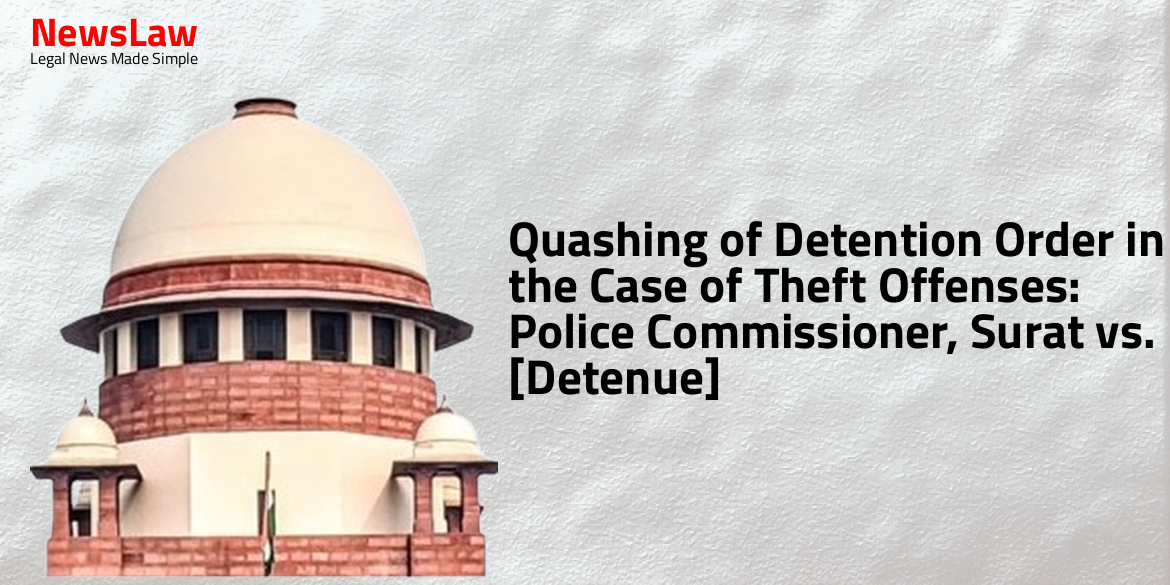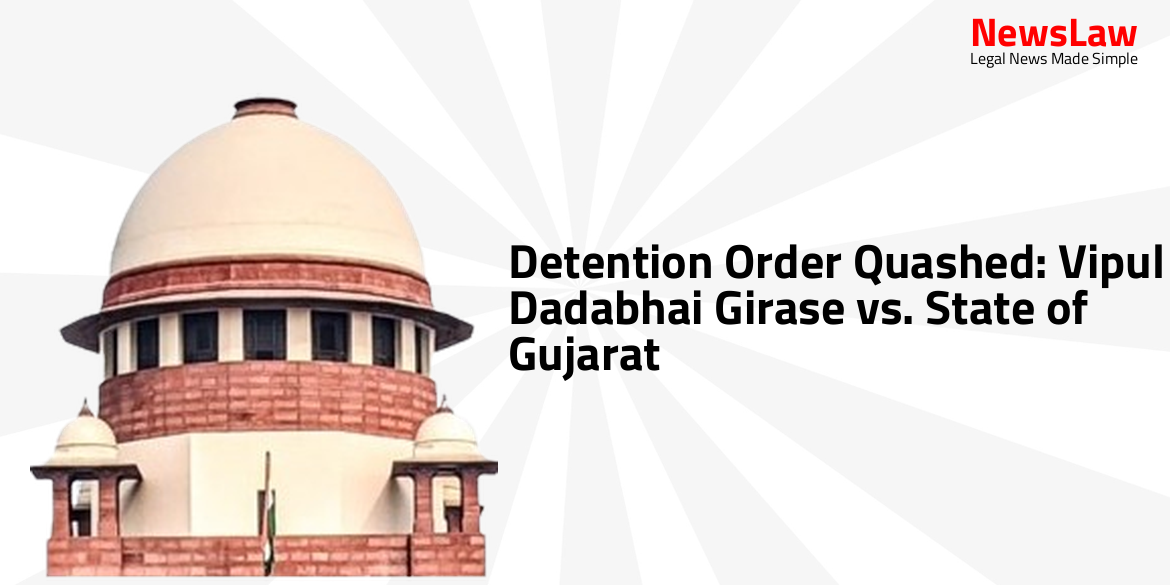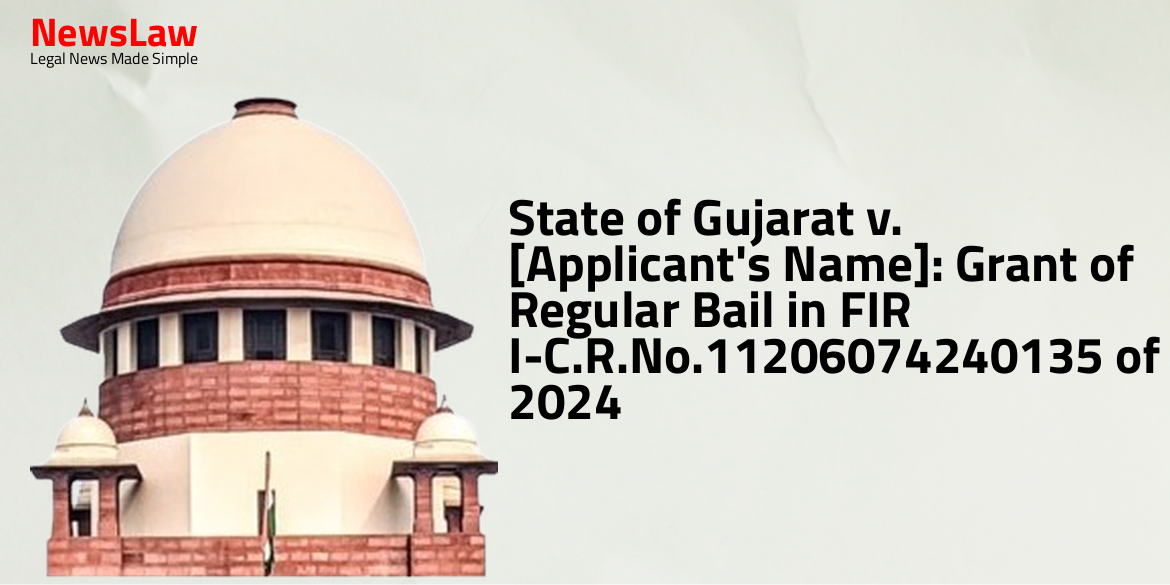In a significant legal development, the Gujarat High Court has ruled on the detention order involving the Police Commissioner, Surat and [Detenue] regarding theft offenses. The court’s decision to quash the detention order sheds light on the distinction between law and order versus public order, emphasizing the need for substantial evidence in cases impacting public peace. This ruling marks a crucial point in understanding the application of preventive detention laws in cases not directly threatening public order. Read on to delve deeper into the implications of this judgment.
Facts
- The court found that aside from witness statements, FIRs, and Panchnama, there was no other substantial evidence linking the detainee’s alleged anti-social activities to a breach of public order.
- No additional relevant or convincing material was presented to establish a connection between the detainee’s actions and disruption of public peace.
- The court emphasized the lack of concrete evidence supporting the detainee’s involvement in activities that could jeopardize public order.
- The investigation did not yield any significant evidence beyond witness testimonies and official documents, indicating a weak link between the detainee’s behavior and public disorder.
- The absence of compelling evidence beyond procedural documentation raised doubts about the detainee’s alleged role in inciting public unrest.
Issue
- The petition is filed under Article 226 of the Constitution of India seeking relief to quash and set aside the order of detention dated 02.11.2023 passed by the Police Commissioner, Surat.
- The petitioner has been detained as a ‘dangerous person’ based on two registered offences.
- The challenge is focused on the detention order, arguing that the mere registration of offences under the Indian Penal Code is insufficient to meet the definition under section 2(c) of the Act.
- The advocate for the detenue contends that the alleged illegal activity does not relate to the maintenance of public order but rather pertains to a breach of law and order.
Arguments
- The advocate for the petitioner argues that the detenue’s activities related to criminal cases did not significantly impact society’s tempo.
- The theft offenses primarily involve stealing clothes from private individuals and do not constitute a breach of public order.
- The grounds of detention do not indicate that the petitioner’s sporadic acts caused any disturbance to public order.
- The detaining authority had the option to cancel the bail of the petitioner.
- The detaining authority had sufficient material to pass the order of detention.
- The petitioner had confessed to the theft of cloths, as referenced in the order of detention.
- There were other supporting evidences considered by the detaining authority such as the drawing of panchnama.
Analysis
- The detaining authority did not consider cancellation of bail or restoration of the procedure for cancellation of bail as a method to curb the petitioner’s activities.
- The FIRs against the petitioner are under serious IPC chapters, potentially labeling the petitioner as a ‘dangerous person’.
- The detaining authority’s subjective satisfaction was deemed illegal and invalid as the alleged offenses in the FIRs did not pertain to public order as required by the Act.
- The allegations against the petitioner were not significant enough to categorize the petitioner as a threat to public order within the defined scope of the Act.
- The distinction was made between minor breaches of peace and disturbances that significantly impact public order within the context of the Preventive Detention Act.
- The petitioner, who is out on bail for the offenses in question, is subject to ordinary law to prevent further misconduct, rendering preventive detention unnecessary for maintaining public order.
- The Court distinguishes between ‘law and order’ and ‘public order’.
- Not every act of assault or injury to specific persons constitutes public disorder.
- Reference is made to the case of Pushker Mukherjee v. State of West Bengal to emphasize this distinction.
- The Detaining Authority failed to consider the option of cancelling bail, which affected the subjective satisfaction required for detention.
- Citing the case of Shaik Nazeen v. State of Telangana and Ors., the Supreme Court highlighted that the contravention of any law must impact the community or the public at large to be considered as affecting public order.
- The State should seek cancellation of bail or appeal to Higher Court if detenue is a menace to society
- Preventive detention law is not the proper remedy in this case
- The offence seemed to be related to business trading activities
- Registration of FIR alone does not indicate breach of public order for invoking section 3(2) of the Act
- The petition is allowed, and the detention order dated 02.11.2023 is quashed
Decision
- The detenue is ordered to be set at liberty forthwith if not required in any other case.
- Direct service is permitted.
- The Rule is made absolute accordingly.
Case Title: IMRAN @ FAVDA S/O JAKIRBHAI SHAIKH Vs. STATE OF GUJARAT
Case Number: R/SCA/20158/2023



